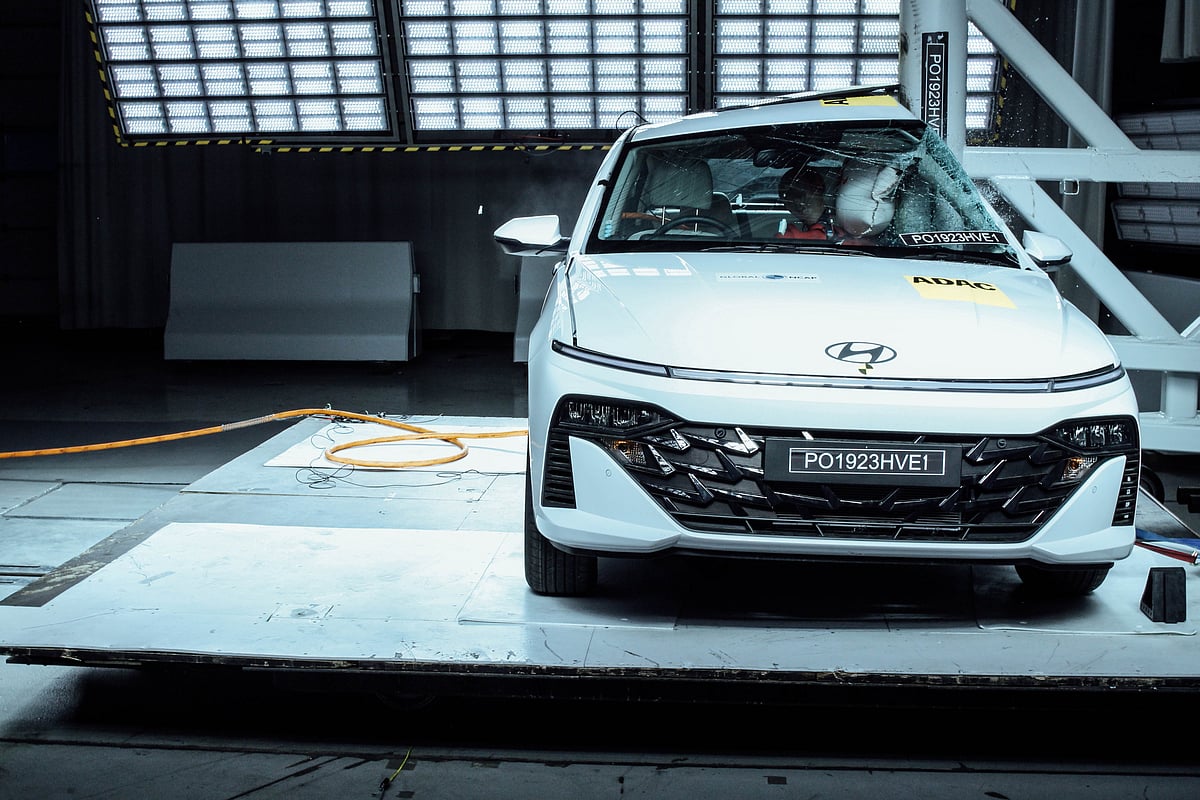Hyundai Verna scores 5-star safety rating in Global NCAP crash test
The Hyundai Verna was tested under Global NCAP standards with the most basic passive safety specification of six airbags and ESC as standard
 The 2023 Hyundai Verna scored 28.18 (out of 34) in adult safety, while it scored 42.00 (out of 49) in child occupant safety in the Global NCAP safety test
The 2023 Hyundai Verna scored 28.18 (out of 34) in adult safety, while it scored 42.00 (out of 49) in child occupant safety in the Global NCAP safety testThe 2023 Hyundai Verna is the first made-in-India Hyundai vehicle to score the coveted full 5-star Global NCAP safety rating. These safety ratings apply to both adult and child occupants. Notably, the test was carried out on the Verna's most basic variant, which came standard with six airbags and ESC.
Hyundai Motors India Limited has also announced that all of their models will now come standard with six airbags across all variants. Furthermore, the company has confirmed that three of its models have been sent to undergo safety testing with Bharat NCAP, with plans to expand this initiative to more models in the future.
The Hyundai Verna received a 5-star rating, with scores of 28.18 out of 34 for adult occupant protection and 42 out of 49 for child occupant safety. Notably, the footwell area was rated as unstable by the testing body. The bodyshell was also rated as unstable, and it cannot withstand additional loads. In comparison, the Volkswagen Virtus and Skoda Slavia, both of which received 5-star ratings, received 29.71 out of 34 points for adult occupant protection and 42 out of 49 points for child occupant safety.
Adult occupant tests
Frontal impact test (at 64kmph)
The driver's and passenger's head and neck protection were deemed good. However, the driver's chest had marginal protection, while the passenger's chest received a rating of good. Both the driver's and passenger's knees offered marginal protection, potentially exposing them to hazardous structures behind the fascia. The protection for the driver's tibias was rated as adequate, while the passenger's tibias received ratings of good and adequate. The footwell area and bodyshell were both assessed as unstable, with the bodyshell lacking the capability to withstand additional loads.
Side impact test (at 50kmph)
The head, pelvis, and abdomen exhibited good protection, whereas the chest demonstrated adequate protection.
Side pole impact test (at 29kmph)
Standard curtain airbags meet fitment requirements, providing good protection to the head and pelvis, marginal protection to the chest, and adequate protection to the abdomen.
Electronic Stability Control (ESC)
ESC is standard, and its performance in the test met Global NCAP's latest requirements.
Seat belt reminder (SBR)
SBR is mandatory for all seating positions but is only present in the front seats.
 2023 Hyundai Verna side impact test in Global NCAP safety test
2023 Hyundai Verna side impact test in Global NCAP safety testChild occupant tests
Frontal impact test (at 64kmph)
The child seats for the 3-year-old and 18-month-old were rearward-facing with i-size anchorages and support legs, ensuring full protection by preventing head exposure during the frontal impact.
Side impact test (at 50kmph)
Both Child Restraint Systems (CRS) provided complete side impact protection.
 2023 Hyundai Verna side pole impact test in Global NCAP safety test
2023 Hyundai Verna side pole impact test in Global NCAP safety test2023 Hyundai Verna safety features
The 2023 Verna has six airbags, a tyre pressure monitoring system, hill-start assist, ABS, EBD, ESC, TC, disc brakes on all four wheels, cornering headlights, and front parking sensors. In the higher variants, it also has Level 2 ADAS technology, which includes features like forward collision warning, blind spot collision warning, blind spot collision-avoidance assist, lane keeping assist, lane departure warning, driver attention warning, adaptive cruise control with stop-and-go functionality, lane following assist, leading vehicle departure alert, and rear cross-traffic collision-avoidance assist, all of which are designed to protect pedestrians and cyclists.
The Hyundai Verna is available in four main variants: EX, S, SX, and SX(O). Prices range between Rs 10.96 lakh and Rs 17.38 lakh (ex-showroom Delhi).


